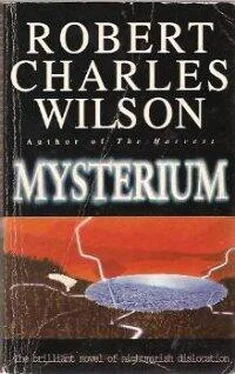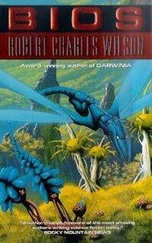Mysterium
by Robert Charles Wilson
for Jo:
parallel worlds
The Republic of Turkey, 1989
On a dry inland plain, under a sky the color of agate, a handful of Americans scuffed at a rubble of ancient clay masonry.
The Americans, mainly graduate students doing fieldwork toward their degrees and a few tutelary spirits in the form of faculty members, had arrived three weeks ago. They had driven from Ankara by Land Rover, away from the Kizil Irmak and into the heart of the dry central plateau, where a neolithic Anatolian townsite had lain dormant for almost nine thousand years. They had erected their tents and Porta Potties in the shade of a rocky hill, and in the cool of the morning they worried the soil with wire brushes and whisk brooms.
The site was ancient, but small and not very productive. A graduate student named William Delmonico was nibbling his way through a string grid that had produced only a few flaked stones, the prehistoric equivalent of the cigarette butt, when he uncovered what looked like a shard of polished jade—an anomalous substance, and immensely more interesting than the flints he had already cataloged.
The jade fragment was deeply embedded in the stony earth, however, and no amount of toothbrushing would free it. Delmonico alerted his adviser, a tenured professor of archaeology who welcomed this respite from what had begun to seem like a wasted summer of fruitless and repetitive fieldwork. Delmonico’s nubbin of glass (not jade, certainly, though the resemblance was marked) represented at least an intellectual challenge. He assigned two experienced diggers to the grid but allowed Delmonico his proprietary excitement. Delmonico, a lanky twenty-one-year-old with a shine of sweat on his face, hovered over the site.
Three days later a jagged spar of dull green material the size of a tabletop had been uncovered… and still it remained embedded in the earth.
That was odd. Even more peculiar, it looked as if they would have to call in a materials expert to identify this substance. It was not jade, not glass, not pottery of any kind. It retained its warmth long after sunset—and nights were often brutally cold on this high, arid plain. And it looked strange. Deceptive to the eye. Slippery. From a distance, it seemed almost to shrink—to disappear, if you stood a few yards outside the dig, in a stitch of air and sand.
On the fourth day after his discovery Delmonico was confined to his tent, vomiting every twenty or thirty minutes into a half-gallon mason jar while a wind storm battered the canvas and turned the air to chalk. He had come down with the flu, everyone said. Or common dysentery—he wouldn’t be the first. Delmonico accepted this diagnosis and resigned himself to it.
Then the sores appeared on his hands. The skin blackened and peeled away from his fingers, and the bandages he applied turned yellow with suppuration. Blood appeared in his stools.
His faculty supervisor drove him to Ankara, where an emergency room physician named Celal diagnosed radiation sickness. Celal filed a report with his chief of staff; the chief of staff notified an official of the Ministry of Public Health. The doctor was not surprised, given all this, when the delirious young American was taken from the ward by a military escort and driven into the night. It was a mystery, Celal thought. But there were always mysteries. The world was a mystery.
Delmonico died in a closed ward of a U.S. Air Force medical complex a week later. His companions from the dig were quarantined separately. The two postgrads who had labored over the jade fragment lived another day and a half before dying within an hour of each other.
The rest of the expedition were treated and released. Each was asked to sign a paper acknowledging that the events they had witnessed were classified and that divulging those events to anyone for any reason would be punishable pursuant to the Official Secrets Act. Shaken and at a loss to make any sense of what had happened, all fourteen surviving Americans agreed to sign.
Only one of them broke his oath. Seven years after the death of William Delmonico, Werner Holden, formerly an archaeology major and now an auto parts dealer in Portland, Oregon, confessed to a professional UFO researcher that he had witnessed the recovery of a portion of the hull of a flying saucer from an archaeological site in central Turkey. The UFO researcher listened patiently to Holden’s story and promised to look into it. What he did not tell Holden was that the whole crash-fragment approach had grown unfashionable—his audience expected something more intimate: abductions, metaphysics. A year later, Holden’s account appeared in the researcher’s book as a footnote. No legal action was taken as a consequence. Holden died of a runaway lymphoma in January of 1998.
The Jade Anomaly, as Delmonico had thought of it before his death, was retrieved from the soil of the abandoned archaeological site by a platoon of military men equipped with spades and protective clothing. They worked at night under floodlights so the sun wouldn’t cook them inside their lead-lined suits. Over the course of three nights they succeeded in unearthing a gently curved piece of apparently homogeneous material 10.6 cm thick and irregular in shape. One observer said it looked like a piece of an egg shell, “if you can imagine an egg big enough to hatch a stretch limo.” The fragment was highly radioactive in the wavelengths around 1 nm, but the intensity of the radiation fell away to undetectability at distances greater than a meter or so, an apparent violation of the inverse-square law that no one attempted to explain.
Arrangements were made with the Turkish government to have the material quietly removed from the country. Blanketed in lead and packed in an unmarked shipping flat, it left a NATO airbase in a Hercules transport bound for an undisclosed destination in the United States.
∞
Alan Stern, a professor of theoretical physics and recent recipient of the Nobel prize, was approached at a conference on inflationary theory at a hotel outside Cambridge, Massachusetts, by a young man in a three-piece suit—quite an anomaly, Stern thought, among this rabble of thesis-writers, academic hacks, bearded astrophysicists, and balding cosmologists. Stern, both bearded and balding, was intrigued by the younger man’s air of quiet authority, and the two of them adjourned to the bar, where the younger man disappointed Stern by offering him a job.
“I don’t do classified work,” he said. “If I can’t publish it, it’s not science. In any case, defense research is a dead end. The Cold War is over, or hasn’t that news reached your Appropriations Committee?”
The younger man displayed an impenetrable patience. “This isn’t, strictly speaking, a defense project.”
And he explained further.
“My God,” Stern said softly, when the young man had finished. “Can this be true?”
∞
That evening, Stern sat in the audience as a Lucasian Professor of Mathematics read a paper defending the anthropic principle in the language of set theory. Bored by the lecture and still excited by what the young man had told him, Stern took a notebook from his pocket and opened it across his knee.
God is the root of the All, he wrote, the Ineffable One who dwells in the Monad.
He dwells alone, in silence.
∞
The Two Rivers Physical Research Laboratory was constructed over the course of six months on a parcel of uninhabited land in northern Michigan deeded to the government by an impoverished Ojibway band.
The nearby town of Two Rivers accepted the facility without complaint. Two Rivers had begun life as a mill town, survived as a hunting and fishing town, and had recently become an alternative to the suburbs for white-collar workers who commuted by fax and modem. The main street had been refurbished with imitation brickwork and gas lights, and a gourmet coffee shop had opened up next to the Baskin-Robbins. Lately there had been complaints about water-skiers chasing the ducks out of Lake Merced. Sports fishermen complained and hired charter planes to carry them farther from the encroachments of civilization, but the town was prospering for the first time in thirty years.
Читать дальше












